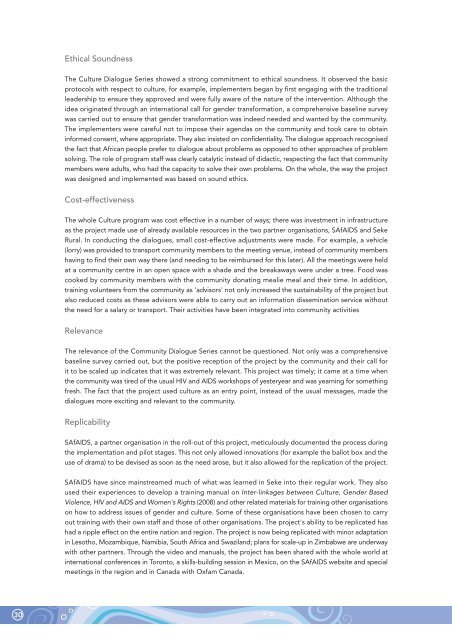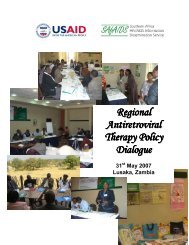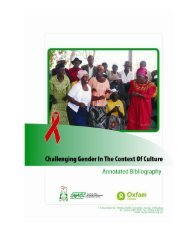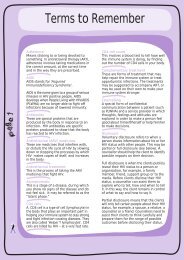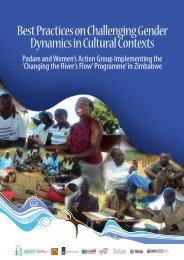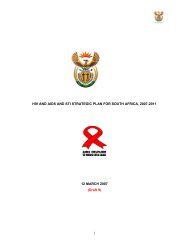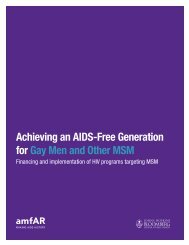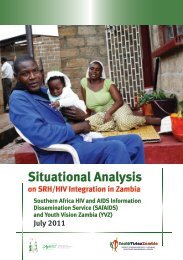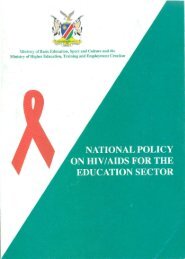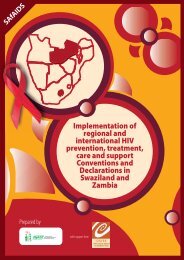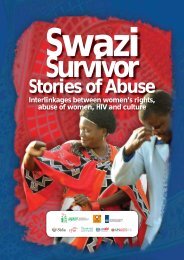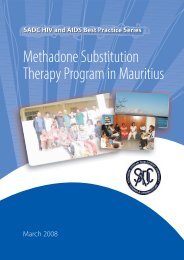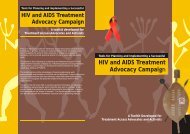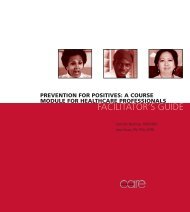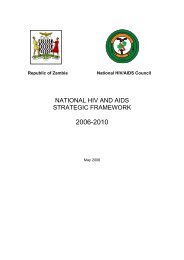Zimbabwean stories of "Best Practice" - SAfAIDS
Zimbabwean stories of "Best Practice" - SAfAIDS
Zimbabwean stories of "Best Practice" - SAfAIDS
Create successful ePaper yourself
Turn your PDF publications into a flip-book with our unique Google optimized e-Paper software.
Ethical SoundnessThe Culture Dialogue Series showed a strong commitment to ethical soundness. It observed the basicprotocols with respect to culture, for example, implementers began by first engaging with the traditionalleadership to ensure they approved and were fully aware <strong>of</strong> the nature <strong>of</strong> the intervention. Although theidea originated through an international call for gender transformation, a comprehensive baseline surveywas carried out to ensure that gender transformation was indeed needed and wanted by the community.The implementers were careful not to impose their agendas on the community and took care to obtaininformed consent, where appropriate. They also insisted on confidentiality. The dialogue approach recognisedthe fact that African people prefer to dialogue about problems as opposed to other approaches <strong>of</strong> problemsolving. The role <strong>of</strong> program staff was clearly catalytic instead <strong>of</strong> didactic, respecting the fact that communitymembers were adults, who had the capacity to solve their own problems. On the whole, the way the projectwas designed and implemented was based on sound ethics.Cost-effectivenessThe whole Culture program was cost effective in a number <strong>of</strong> ways; there was investment in infrastructureas the project made use <strong>of</strong> already available resources in the two partner organisations, <strong>SAfAIDS</strong> and SekeRural. In conducting the dialogues, small cost-effective adjustments were made. For example, a vehicle(lorry) was provided to transport community members to the meeting venue, instead <strong>of</strong> community membershaving to find their own way there (and needing to be reimbursed for this later). All the meetings were heldat a community centre in an open space with a shade and the breakaways were under a tree. Food wascooked by community members with the community donating mealie meal and their time. In addition,training volunteers from the community as 'advisors' not only increased the sustainability <strong>of</strong> the project butalso reduced costs as these advisors were able to carry out an information dissemination service withoutthe need for a salary or transport. Their activities have been integrated into community activitiesRelevanceThe relevance <strong>of</strong> the Community Dialogue Series cannot be questioned. Not only was a comprehensivebaseline survey carried out, but the positive reception <strong>of</strong> the project by the community and their call forit to be scaled up indicates that it was extremely relevant. This project was timely; it came at a time whenthe community was tired <strong>of</strong> the usual HIV and AIDS workshops <strong>of</strong> yesteryear and was yearning for somethingfresh. The fact that the project used culture as an entry point, instead <strong>of</strong> the usual messages, made thedialogues more exciting and relevant to the community.Replicability<strong>SAfAIDS</strong>, a partner organisation in the roll-out <strong>of</strong> this project, meticulously documented the process duringthe implementation and pilot stages. This not only allowed innovations (for example the ballot box and theuse <strong>of</strong> drama) to be devised as soon as the need arose, but it also allowed for the replication <strong>of</strong> the project.<strong>SAfAIDS</strong> have since mainstreamed much <strong>of</strong> what was learned in Seke into their regular work. They alsoused their experiences to develop a training manual on Inter-linkages between Culture, Gender BasedViolence, HIV and AIDS and Women's Rights (2008) and other related materials for training other organisationson how to address issues <strong>of</strong> gender and culture. Some <strong>of</strong> these organisations have been chosen to carryout training with their own staff and those <strong>of</strong> other organisations. The project's ability to be replicated hashad a ripple effect on the entire nation and region. The project is now being replicated with minor adaptationin Lesotho, Mozambique, Namibia, South Africa and Swaziland; plans for scale-up in Zimbabwe are underwaywith other partners. Through the video and manuals, the project has been shared with the whole world atinternational conferences in Toronto, a skills-building session in Mexico, on the <strong>SAfAIDS</strong> website and specialmeetings in the region and in Canada with Oxfam Canada.30


